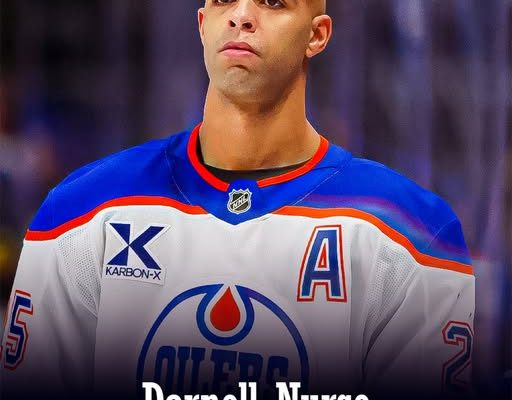Darnell Nurse’s career with the Edmonton Oilers has been one of dedication, grit, and leadership, but in recent years, his presence on the team’s blue line has sparked an intense and polarizing debate. The turning point came in 2021 when the Oilers signed him to a massive eight-year, \$74 million contract extension that carries a \$9.25 million annual cap hit. The moment that deal kicked in during the 2022–23 season, the expectations on Nurse reached unprecedented levels. Suddenly, he wasn’t just the dependable defenseman who could log heavy minutes and bring physicality — he was now expected to deliver elite-level performances comparable to the NHL’s top defensemen. That expectation, fueled by the size of his contract, has led to criticism, particularly when his numbers on the scoresheet don’t appear to justify the price tag. But the story of Darnell Nurse and his value to the Oilers isn’t as simple as statistics or salary; it’s layered with context, nuance, and the realities of playing in a hockey market obsessed with winning a Stanley Cup.
During the 2024–25 regular season, Nurse played 76 games, registering five goals and 28 assists. These numbers are solid for a defenseman, especially one tasked with playing against the opposition’s best players every night. However, when you consider the elite tier of NHL defensemen — players like Cale Makar or Victor Hedman — the gap becomes apparent. Those players not only excel defensively but also put up offensive numbers that make them game-changers. Critics argue that Nurse’s performance does not match the standard set by his salary, which ranks him among the highest-paid defensemen in the league. The scrutiny intensifies in the playoffs, where every play is magnified. Nurse’s postseason numbers dipped again, and there were games where defensive lapses or untimely penalties added fuel to the fire of fan frustration. In a league where salary cap flexibility is crucial to building a contender, a contract like Nurse’s is always going to be under the microscope — particularly when the Oilers need to re-sign younger stars like Evan Bouchard.
One of the primary criticisms surrounding Nurse is that his hefty contract limits Edmonton’s ability to improve its roster. With \$9.25 million annually tied to a single player, the Oilers have less room to maneuver when it comes to adding depth or retaining other key contributors. Fans and analysts have repeatedly questioned whether Nurse provides enough value on the ice to warrant such a significant financial commitment. This perception of being “overpaid” has turned him into something of a lightning rod for debate. For every big hit or crucial defensive play he makes, detractors are quick to point out moments when he is caught out of position or when his offensive contributions fall short of expectations. This relentless scrutiny is amplified by the passionate hockey culture in Edmonton, where fans and media alike dissect every shift during the team’s pursuit of the Stanley Cup.
Yet, despite the criticisms, there is another perspective that paints Nurse in a much more favorable light. Defense is one of the most demanding positions in hockey, especially for a player tasked with shutting down the league’s best forwards night after night. Nurse is often deployed in the toughest situations, taking on top lines, killing penalties, and logging heavy ice time. These are the kinds of responsibilities that don’t always show up in the box score but are vital to a team’s success. Coaches and teammates frequently defend Nurse, praising his work ethic, physical presence, and leadership in the locker room. They argue that he is not just a player, but a cornerstone of the Oilers’ defensive identity. In fact, some observers suggest that Nurse’s biggest problem isn’t that he’s overpaid, but that he’s overworked. Due to the Oilers’ defensive depth issues, he is often asked to shoulder an outsized role, which can expose weaknesses or lead to mistakes in high-pressure moments.
The timing of Nurse’s contract is also worth examining. When Edmonton signed him to that eight-year deal in 2021, the market for defensemen was inflated. Other top players at his position, such as Seth Jones, had signed massive contracts — Jones’s deal with the Chicago Blackhawks came in at \$9.5 million annually. The Oilers were determined to keep Nurse during what they viewed as his prime years, and waiting any longer could have meant paying an even higher price. Nurse had already played on two bridge deals with the team, and locking him down long-term was seen as a move to ensure stability on the back end. In that context, the contract can be viewed as a calculated gamble on consistency and loyalty rather than a strict evaluation of point production. Edmonton believed that Nurse’s value extended beyond raw numbers, encompassing leadership, physicality, and his ability to log big minutes in critical situations.
Comparing Nurse to truly elite defensemen like Makar or Hedman may not be entirely fair, given the different roles they play and the unique skill sets they bring to the table. Nurse is not known for dazzling offensive plays or highlight-reel goals, but he excels in areas that are harder to quantify. He is a strong skater for his size, a punishing hitter, and a player who can wear down opponents over the course of a series. His presence on the ice brings a level of toughness that can’t be overlooked, particularly in the playoffs when the game becomes more physical and every battle matters. While his offensive numbers may not justify his cap hit in the eyes of some, his overall contribution to the Oilers’ defensive structure is significant.
The debate surrounding Nurse also highlights a broader issue in the NHL: the constant tension between salary cap value and on-ice performance. In a hard-cap league, every dollar spent on a player is scrutinized, especially for teams like the Oilers who are in “win-now” mode. Fans often expect high-priced players to deliver game-changing moments, and when that doesn’t happen, frustration builds. Nurse’s contract has become a symbol of that tension, with many questioning whether Edmonton could have allocated those resources more effectively. At the same time, the Oilers’ success during recent playoff runs has been due in part to Nurse’s willingness to do the hard, thankless work that allows stars like Connor McDavid and Leon Draisaitl to shine. Without players like Nurse eating tough minutes and handling defensive responsibilities, the team’s offensive weapons would have far less freedom to dominate.
The 2024–25 season underscored this dynamic yet again. Nurse’s production was steady but unspectacular, and in the playoffs, his performance became a lightning rod for criticism. Fans wanted more offense, more game-changing plays, and fewer defensive miscues. But the reality is that no defenseman can play mistake-free hockey, especially when tasked with such heavy responsibilities. It’s easy to forget that Nurse is often on the ice against the best players in the world, where even the slightest error can lead to a goal. His role is designed to be more about containment than flash, and while that may not satisfy everyone, it remains a crucial part of the Oilers’ formula for success.
What makes Nurse’s situation particularly interesting is his unwavering commitment to Edmonton. Despite the criticism and the whispers of trade speculation, he reportedly declined to waive his no-movement clause this offseason when approached by the team. This decision sends a clear message: Nurse wants to be part of the Oilers’ journey to a Stanley Cup, regardless of how challenging the road may be. That kind of loyalty is not always common in professional sports, where players often seek greener pastures or better opportunities elsewhere. Nurse’s desire to stay and help Edmonton win speaks volumes about his character and his belief in the team’s potential.
The coming seasons will be critical for both Nurse and the Oilers. With the team firmly in its championship window, every move and every performance will be closely scrutinized. If Edmonton can capture a Stanley Cup with Nurse playing a key role, much of the criticism surrounding his contract will likely fade away. Winning has a way of silencing debates about value and salary. On the other hand, if the Oilers continue to fall short, Nurse’s contract will remain a focal point for fans and analysts who argue that the team’s resources are not being used effectively. This narrative will only intensify as younger players, like Bouchard, demand new contracts that further squeeze the salary cap.
In the end, the truth about Darnell Nurse lies somewhere between the extremes. He is not the elite, game-breaking defenseman that some fans want him to be, but he is far from a liability. His contract may be an overpay based on current production, but it also reflects the market conditions at the time and Edmonton’s belief in his long-term value. Nurse is a player who takes on thankless roles, absorbs heavy criticism, and still shows up to battle every night. His combination of toughness, leadership, and reliability makes him an essential piece of the Oilers’ puzzle, even if he doesn’t always get the credit he deserves.
As the Oilers continue their push for a Stanley Cup, Darnell Nurse’s story will remain one of the most intriguing subplots. His contract will always be part of the conversation, but his true worth can only be measured in the context of the team’s success. If he helps lead Edmonton to a championship, the narrative will shift from one of overpayment to one of investment paying off. Until then, Nurse will continue to navigate the delicate balance between expectation and performance, striving to prove that he is more than just a number on a salary cap sheet.



